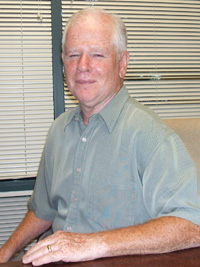By John Mulholland
By whatever genetic twist that has been in play, I have always been interested in other people’s cultures, countries, languages, and histories. At age ten a teacher remarked, “that’s as far away as Yemen.” I flattered myself that I knew every country on the globe but this was one I had obviously missed. I ran to the Atlas to fill the void. Although I found Yemen and its nearby countries of interest, I could hardly have imagined that, thirteen years later, I would dedicate most of my adult life to the Arab world and various aspects of the Arab-U.S. relationship.

Mr. John Mulholland, Chairman of the Board of Directors, National Council on U.S.-Arab Relations
At the age of seventeen, I was fortunate to spend over a year traveling around Mexico and Central America. The experience inspired me, for the first time, to learn a language and assimilate a culture. I joined the Army at eighteen years of age and was stationed in Livorno, Italy. At the time, I was a fanatical bicycle rider trying hard to be the first Lance Armstrong. After my Army stint I remained in Italy to race but finally realized, sadly, that I was not built to be a first rate professional rider. Even so, I gained another language and knowledge of another culture.
By chance, the headquarters for Middle East operations of the US Army Corps of Engineers was located at the Army base where I had served in Italy. They offered me a position in their Jeddah office running their high frequency communications. By then I had read everything I could find by the great mid-twentieth century traveler and explorer in the Arab world, Wilfred Thesiger, who stoked my romantic interest. I also read everything else I could find on the region. I already knew the general geography, a little history of Saudi Arabia and the Arab-Israeli conflict, but none of this prepared me for Beirut, where I landed in October, 1968 during what in retrospect was viewed by many as the city’s golden age in the modern era. Nothing could have prepared me for the kaleidoscope of cultures, cuisines, and languages I found there, all picture postcard framed by the Mediterranean Sea in front and the terraced mountains behind. I said to myself, “If this is the Middle East, I’ll take it.”
Only a few days later I landed in Riyadh. If Beirut was filled with Western influences that I was familiar with, Riyadh was different. I was hardly put off, I was ecstatic. Now, after Latin America and Italy, I felt prepared to tackle another culture and language. I quickly found a superb classical Arabic teacher who within a month had taught me to write, basic grammar, and the beginnings of Gulf dialect. In those days, Riyadh was still a city constructed mainly of mud brick dwellings, with a road into the desert to the airport lined by Egyptian-built ministerial offices. On weekends and holidays, I used every spare minute to explore Riyadh, the central province of Najd, and also the Eastern Province, center of the country’s massive energy reserves.
All too soon, I was moved to my permanent assignment in Jeddah. Even though Riyadh was the capital of the kingdom, all the embassies and most of the foreign companies were in Jeddah. (The Corps of Engineers was the first foreign concern allowed to be established in Riyadh). In Jeddah I was fortunate to find an office of only five people and was able to avoid having to live in a corporate compound. If Americans or any other foreigners wanted a social life, they had to go out and make it. I soon found that Jeddah offered incredible opportunities. Many of our government’s best diplomats and Arabists served in the US Embassy in Jeddah in the 1960s and 70s. People like Hermann Eilts, Ray Close, Charles Cecil, Bill Stoltfuz, and, to my mind and many others, the most remarkable of them all, Hume Horan, who would become a lifelong friend and mentor, were stationed there.
Continue reading »



You must be logged in to post a comment.